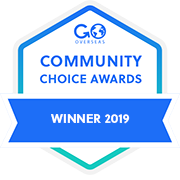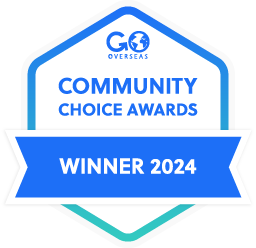Why did you choose this program?
I wanted a program sufficiently tailored to my incoming level of Spanish that I could start learning from day one with little review, and build on that. It has been decades since my college and high school introductory courses, and I'd been studying on my own a bit in recent years, but nothing organized or structured. I followed a few beginner language learning programs on YouTube and Podcasts, and joined a conversational practice group that met at a local coffee shop one summer, but I felt stuck; like I couldn't advance past
moderate to high beginner levels, about A-2. I could travel to a Spanish-speaking country and "get by", but I couldn't have a practical conversation without worrying that the next phrase was going to be vocab I wasn't familiar with or a phrase where I understood each separate word, but couldn't make the sentence make sense. To advance I needed to hear and use daily life idioms and Spanish sentence structure that is unique to Spanish, and often slightly different in South America vs Europe.
So I started looking into immersion programs overseas where I could live among like-minded language learners within a Spanish-speaking culture while also having the guiding knowledge and structure offered by teachers within an educational program. It was important to me to find a program that wasn't just conversational, because as much I believe we have to "just use it" in order for it to become natural, it helps me to know "why" I'm using "de claridad" rather than "con claridad" as we would in English for example. Knowing the reason "estar" and "ser" are not interchangeable even though they both mean "to be" actually makes it easier, not harder for me to "just memorize the rule". Understanding the logic behind sentence construction helps me have the confidence to communicate spontaneously, because then I know I can change what or how I'm trying to convey something, and it helps me understand differences I hear when someone says the same thing in a different way.
A program with a small number of students and with a didactic component felt like a fit for me also. I liked classes being almost in a school-like format, learning in a traditional manner with a teacher, a white board, taking notes, reading books and worksheets, studying, memorizing, rehearsing. I hoped to find a program that offered at least some of this kind of pretty standard instruction, but also significant opportunity for casual conversational practice among ourselves and out in the community among native speakers. I like to have fun, but no longer wild, 20-something party fun. So I was interested in an active, somewhat older, serious, but not stuffy group interested in a variety of interests we could share with each other. I was open to singles, couples, and families, but was looking for a program that wasn't a "family vacation" environment where entertaining the children consumed much of the adult focus rather than learning the language. Lastly, I hoped for a program rigorous enough that I'd truly enhance what I'd already learned, not just repeat basic travel level speaking. Ideally, the program would be intensive enough that with my diligence I could confidently say I shifted up maybe 1/2 a level in 2 weeks. ALL of that was delivered at Agualivar!
What did your program provider (or university) assist you with, and what did you have to organize on your own?
Agualivar provided all hardcopy learning materials. We brought our own laptops or tablets. They provided 4-star accommodations minus towels and toiletries, 3 high quality meals/day during the week, transportation to/from the local bus stop in town. We provided our own air, and bus or train arrangements. They provided instructions as to which trains/buses to take from Malaga to their tiny town. We provided our own weekend meal and activity planning and means of getting to/from. Any beverages other than water, coffee or tea were not available.
What is one piece of advice you'd give to someone going on your program?
Be ready to work hard every weekday, all day. This is not a vacation, but you will have fun doing the hard work if you embrace it. Don't fight it. Yes, it's in a beautiful place, with exquisite accommodations overlooking the Mediterranean, but there is very little free time or down time during the weekdays, and the remote locations means there is little to do within walking distance in the couple hours off per day. But it's worth it! And you can plan vacation for the days before or after the program, and on the weekends. It is an intensive, focused, academic and daily practical living skills-based language immersion experience where you will learn more in a day than you thought possible, and more in a week than a semester course in college. If you're not fluent, and have to concentrate to understand each word be ready to dive in and swim for your life. It's the most exhilarating, intimidating, exciting and inspiring plunge I've taken, and I'd do it all over again!
What does an average day/week look like as a participant of this program?
The program starts the moment you are picked up at the bus station by one of the teachers, because she immediately greets you warmly, in Spanish only, and drives the 10 mins. to her house, the school, making casual conversation as we introduced ourself to each other. Inside, we met her friendly and inviting mom who was a professional chef and lives there. She prepared all of our weekday lunches and dinners. Literally, the price of enrollment for a week is less than you'd spend to find comparable meals in a gourmet, Michelin star, high-end restaurant! They showed us around the incredible house and grounds, then to your private rooms and bathrooms. Then settle in for the night. Classes begin after breakfast in the morning at 8:30am.
Breakfast is out on the kitchen counter for your own preparation. Rolls/bread, cereal, yogurt, homemade mango preserves, bananas, grapefruit, homegrown sliced mangos, coffee and tea. At 9:30 we gathered outside on the beautiful veranda, under the shaded sun, watching parrots fly and "talk" overhead, overlooking an in-ground pool perched atop a hillside about 300 feet from the Mediterranean ocean!
One sister conducts the first 90 min. class followed by a 10 min. break. The next sister comes to teach the second 90 min. class. Lunch follows that you help prepare (at least rudimentarily like table setting, pouring water, maybe helping make a salad). Everyone (students, both sisters and mom) gather around the table for a learning lunch which usually consists of casual conversation about the morning, what's going on in the world or someone's chosen topic as we all get to know a bit more about each other. A white board stands at the head of the table where one or the other teacher repeatedly interrupt their own meal to explain a turn of phrase or question that comes up, or to elaborate on something from the morning. It's a fun, natural, intuitive way to learn contextually. This helps the new info stick and we learn and use it in real time, and the "firehose" approach is only slightly stressful for the introverts. It's all part of the stretching that causes the growth that make immersion learning the absolute best as long as you have enough of a foundation to start. By mid-week I felt like I could feel the dendritic branches in my brain expanding ;).
Lunch is followed by a 90 min. break that I usually used to exercise, go for a walk with another student into town or do a bit of homework. Either I got a head start on the homework or stayed up past 9pm to complete whatever was due the next morning.
At 3:30 a family friend came to pick us up for the afternoon "excursion" classes. These were different every day, really fun and interesting. Among the adventures were paleolithic caves; hiking up Lombard St. - like (San Francisco, CA) 30 degree inclined streets in surrounding 17th century picturesque villages like Brigiliana; visiting churches and shops in the quaint hip town of Nerja, finding sea glass along the Mediterranean coastline; checking out a local cafe or "chirrungita"/outdoor bistropub; grocery shopping in Spanish with a list of special ingredients not characteristic to most English speakers, and more. These outings were definitely "class", because not only were they, of course only in Spanish, but they came with worksheets relevant to the event. We had a good time figuring them out together as we took in the relevant experiences. Creative and interesting, the teachers all knew how to encourage our curiosity to keep us talking. This made for fun, novel dinner conversation each night as we shared impressions, asked questions and practiced the new words, phrases or authentic language structures. After these roughly 3 hour events, we returned to the villa for another unmatched, mouth-watering dinner. The nights wound down between 8 and 9pm when we retired to our rooms for a well-earned night's sleep.
Day 2 - 5 of the week progressed as did Day 1. Sat., and Sun. we were on our own except for breakfast which was always laid out in the morning. Most of us took 1 - 2 hour bus rides on the weekend to the cities of Madrid or Granada. I returned back each night, but some stayed overnight in the city, returning Sun. evening to start the next invigorating week of learning and living in Spanish!
Going into your experience abroad, what was your biggest fear, and how did you overcome it? How did your views on the issue change?
Traveling in a foreign country alone with insufficient language skills to communicate effectively enough to resolve a difficult, confusing, intense or dangerous situation. I overcame it by initially learning enough to know that if such a situation arose:
1. I did have enough basic language skills to take care of myself,
2. reminding myself that not everything is going to be comfortable before being 'ready' to do the hard thing, but 'discomfort' does not mean you are not ready, and
3. that taking reasonable, well-researched risks is the only way to make change happen.
My views did not change, I just confirmed that acquiescing to fear never changed anything for the better, avoiding or putting off without forward movement doesn't diminish one's discomfort. It only increases it, and taking action toward learning what you want and doing it is the only way to irradicate the fear and achieve the goal.






















